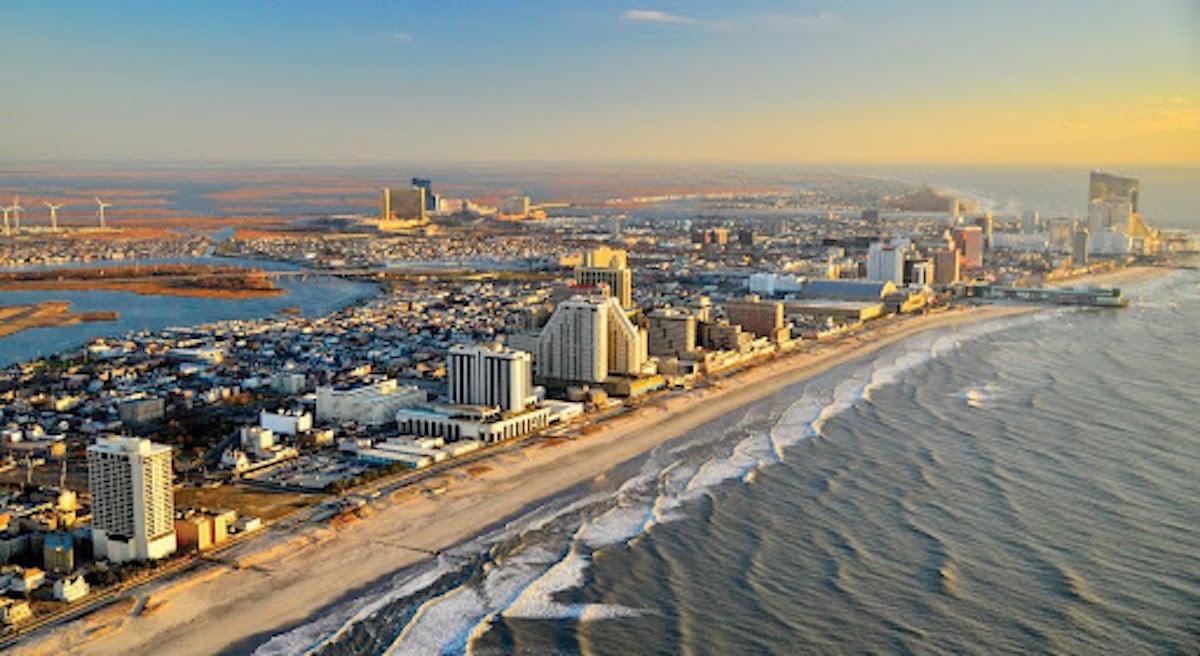Table of Contents
Historically, Atlantic City was a significant real estate asset due to its position along the Atlantic Ocean. The boardwalk was built in 1870 along the beach where casinos and hotels were located. Its purpose was to help property owners keep sand out of their lobbies. The boardwalk would be taken down at the end of the high season.
Overtime—by the beginning of the 21st century—online casinos started appearing, which may be seen as a ‘threat’ to the brick-and-mortar gambling establishments. The iGamingNJ team considered how the casinos impacted the Atlantic City Boardwalk architecture and how online gambling platforms now affect land-based casinos situated along Atlantic City’s famous boardwalk.
Some History Behind
Declension of Atlantic City
After the Volstead Act, also known as Prohibition, was repealed, the tourist population dropped dramatically, and the city was undoubtedly in steep decline. With many families moving into their homes and buying cars, hotels were not in demand. Many bustling hotels and resorts were torn down or converted to apartments.
After the gambling activities in the state had gotten legal, the situation dramatically changed.
Legalized Gambling
A plan to legalize gambling and rebuild the old resort town emerged in the 1970s. Atlantic City suddenly found itself on the verge of its first big comeback, initially sparked by a 1969 referendum to create the New Jersey Lottery.
In 1976, gambling was legalized in Atlantic City. As a result, existing hotels became new casinos, and hotels proliferated along the waterfront.
The original idea was to revitalize the city and bring tourists back, but the city found intense competition in Las Vegas. Donald Trump got big-name boxing matches to attract tourism to the city to combat this; in the 1980s, Mike Tyson had most of his fights in Atlantic City. It helped put Atlantic City on the map as a gambling tourist destination with indelible architecture—especially along Atlantic City Boardwalk.
Atlantic City Boardwalk Casinos History
In the late 1980s, Atlantic City was one of the most popular destinations in the United States—mainly because of big-name boxing matches and casinos. High-rise condominiums were built as permanent residences for people.
The 1980s saw a considerable casino construction boom that forever changed the face of Atlantic City. The Brighton that turned into the Sands Hotel and Casino launched in 1980, right after Harrah’s Casino Hotel and the Golden Nugget. The latter evolved into the establishment named Atlantic Club Casino Hotel. Its exquisite design and eye-catching architecture added some splendor to the Atlantic City boardwalk.
Del Webb’s Claridge and Hi-Ho Casino were run in 1981 and became part of Bally’s. After that, the Playboy Hotel & Casino, later known as Atlantis, Trump Regency, and finally Trump’s World Fair, also opened. The Tropicana Casino and Resort became TropWorld and is now Tropicana.
Harrah’s Boardwalk Hotel Casino was forged back in 1984 in Trump Plaza. It would later be rebranded as the Trump Plaza Hotel and Casino. A year later, Trump Castle became the Trump Marina Hotel and Casino. Many visitors to the casino frequently claim that both the interior and exterior of the building were unique and seemed revolutionary when it was built.
The Showboat Casino Hotel started in 1987, and in April 1990, with the Trump Taj Mahal Casino Resort’s opening. The launch of this last property would close the construction boom in the 1980s. The boom in the gambling industry reflected the boom in architecture. So, from the urbanism viewpoint, land-based casinos are inseparably related to urban planning.
Today, apart from its exciting history and casinos, the boardwalk, its museums, and art galleries are other places in Atlantic City that can pique the interest of adventure seekers. All of the sightseeing mentioned emerged thanks to casinos that needed to attract new players.
Online Gaming Comes to New Jersey
In February 2013, New Jersey legalized online gaming operations for Atlantic City casinos and players within the state’s borders. Today, the state benefits from the popularity and facilities found in online casinos.
Resorts like Borgata Hotel Casino & Spa, Caesars Atlantic City, Golden Nugget Hotel Casino, Resorts Casino Hotel, and Tropicana Casino and Resort now run twenty different online gambling platforms online poker rooms.
Wrap-Up
But the question of land-based casinos as part of the architecture in Atlantic City is not that clear. What will happen if all the casinos located along the Atlantic City boardwalk go online and close? In general, what’s the future of good old on-land casinos and casino infrastructure?
Possibly, no offline casinos would disappear or close within the foreseeable time because they’re partnered with the online ones. However, everything can change because of the pandemic-related events (or any other unforeseen for now). Let’s see what the future holds.


